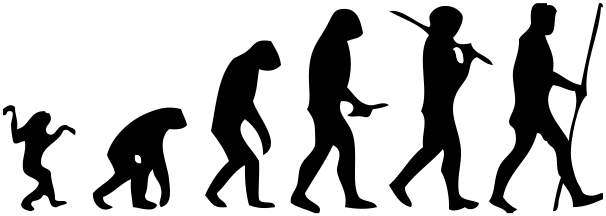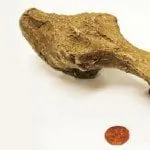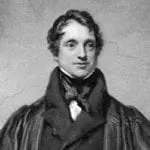Erasmus Darwin’s famous grandson learned early about evolution
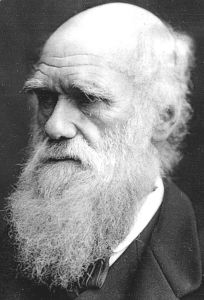
Many people erroneously think that Charles Darwin (who earned a degree in theology) was once blissfully content with the biblical explanation of origins—until, that is, as an unbiased naturalist, he stumbled across the idea of evolution by observing the ‘facts of nature’ in the Galápagos Islands in 1835. The truth is significantly otherwise. The concept of evolution had, in fact, been ‘in his family’ ever since his grandfather, Erasmus Darwin, first suggested it in 1770.1
As we have often pointed out, evolutionists do not have any facts that are unavailable to creationists—it is how these facts are interpreted that is significant, and it is ideology which largely determines the interpretation. Charles Darwin himself said, ‘How odd it is that anyone should not see that all observation must be for or against some view if it is to be of any service!’2
So we need to carefully consider the influences on Darwin’s mindset before he set out aboard the Beagle on his round-the-world trip in 1831. The key to understanding how he was predisposed to interpreting facts in favour of an evolutionary ideology goes back to the beliefs, writings and role model of his grandfather, Erasmus.
Scientist, inventor and doctor
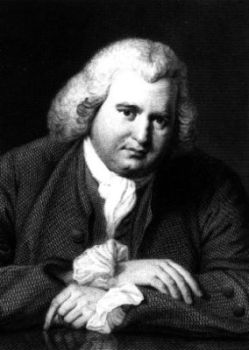
Erasmus Darwin (1731–1802) was one of the most erudite, enthusiastic and dedicated scientists/inventors of his day. He completed a major translation from Latin to English of the works of Carl Linnaeus (1707–1778), who devised the plant classification that forms the basis of modern botany. His many inventions included a speaking machine, a copying machine, and a carriage steering mechanism later used in cars. Indeed, ‘There is scarcely an idea or invention in the modern world that Erasmus Darwin did not originate or foresee, from evolution to eugenics, from airplanes to submarines, from antiseptics to psychoanalysis, from talking-machines to telephones.’3
He began his chosen profession of medicine at Lichfield in 1756. His reputation as a physician was established when he saved the life of a young man from a prominent local family, whom other doctors had declared to be incurable. Because his cures were ‘unfashionably frequent’ his practice gradually became the largest in the English Midlands. King George III asked him to become his personal physician in London, but Erasmus declined.
In about 1766, he co-founded the Lunar Society—a social club for the great scientists, industrialists and natural philosophers of his day. It has been called ‘the think tank of the Industrial Revolution’ and was the most famous English scientific society of the eighteenth century, after the Royal Society. Members included James Watt (of steam-engine fame), Joseph Priestley (the discoverer of oxygen), William Murdoch (the inventor of gas-lighting), Josiah Wedgwood (the great potter) and Samuel Galton (a wealthy industrialist). Others in America linked to the Society included Thomas Jefferson and Benjamin Franklin.
Epicure, free-thinker and poet
His love of food (particularly fruits, sugar, cream and butter)4 was matched by his dislike of exercise, and by the age of 46 he had grown so corpulent that a semi-circle had to be cut out of his dining table to accommodate his girth at meal times. Married twice, he sired 12 Darwin offspring and, in between marriages, a further two (known) illegitimate daughters by a Miss Parker. These girls were raised in his home with his other children, and later were the inspiration for a lengthy tract by Erasmus on female education.5
Erasmus was anti-Christianity, anti-slavery, and pro the American and French Revolutions. An outstanding poet, he often wrote his opinions and scientific ideas in verse, the most notable of which were The Botanic Garden (published in two parts, 1789, 1791), which consisted of 4,384 lines of perfectly rhyming couplets, and The Temple of Nature (published posthumously in 1803).
Sample:
‘Cold gills aquatic form respiring lungs,
And sounds aërial flow from slimy tongues.’6,7
Evolution à la Erasmus
Erasmus first tentatively suggested the idea of evolution in 1770. His family coat of arms featured three scallop shells, and to these he added the Latin words E Conchis omnia (‘everything from shells’). He had this motto painted on his carriage to publicize his theory ‘without anyone noticing’. However, notice they did. Canon Seward of Lichfield Cathedral wrote some satirical verses of his own, complaining that Darwin …
‘… renounces his Creator
And forms all sense from senseless matter.
Great wizard he! by magic spells
Can all things raise from cockle shells.’8
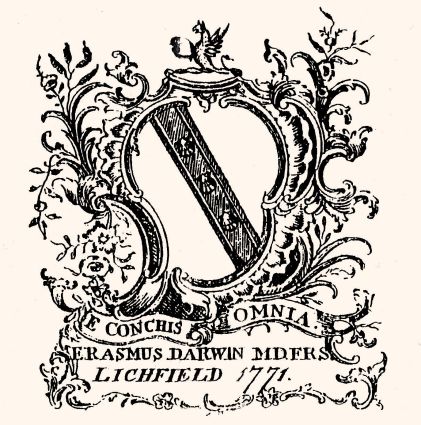
To avoid offending his rich patients, Erasmus painted over the motto on his carriage, and instead put it on his bookplate (1771).
In the next two decades, Erasmus was emboldened to state more and more of his evolutionary ideas. In The Economy of Vegetation (1792), he proclaimed that the earth was formed from a cosmological explosion:
‘When high in ether, with explosion dire
From the deep craters of his realms of fire,
The Whirling Sun this ponderous planet hurl’d,
And gave the astonish’d void another world.’9
In The Botanic Garden, he said that life began in the sea and progressively developed from there:
‘Organic Life beneath the shoreless waves
Was born and nurs’d in Ocean’s pearly caves;
First forms minute, unseen by spheric glass,
Move on the mud, or pierce the watery mass;
These, as successive generations bloom,
New powers acquire and larger limbs assume;
Whence countless groups of vegetation spring,
And, breathing realms of fin, and feet, and wing.’10
His major work, Zoonomia or the Laws of Organic Life (two volumes, 1794 and 1796), was a huge medical treatise in prose, which included a comprehensive classification of diseases and treatments. Within 10 years, four British and two American editions appeared, and it was translated into German, French and Italian. It has been called ‘the first consistent all-embracing hypothesis of evolution’, and was published some 65 years before Charles published his version of evolution in On the Origin of Species in 1859.
Should eye with tenderness all living forms,
His brother-emmets [i.e. ants], and his sister-worms.’12
Erasmus tried to appease the church-going culture of his day by referring to ‘The Great First Cause’, highlighted in capitals, but quickly affirmed that, once started, evolution needs no divine help, but proceeds ‘by its own inherent ability’. He was strongly anti-Christian, and included ‘Credulity, Superstitious Hope, and the Fear of Hell in his catalogue of diseases.’13
These ideas were widely denounced by writers such as the great poet Samuel Taylor Coleridge, who coined the term ‘darwinizing’, meaning speculating wildly, in reference to Erasmus’s evolutionary ideas.14 The Temple of Nature was generally condemned for its ‘total denial of any interference of a Deity’ and he was further assailed for trying ‘to substitute the religion of nature for the religion of the Bible’.15
Erasmus’s influence on Charles
Although Erasmus died seven years before Charles was born, Charles grew up in a household where his father, Robert, had imbibed Erasmus’s ‘free-thinking’ (materialist), anti-Christian ideas. So disbelief was an acceptable trait within the Darwin family—perceived not as ‘a moral crisis or rebellion’, but perhaps even as ‘a filial duty’.16
Charles read and ‘greatly admired’ Zoonomia when he was 18. Years later, when faced with the same sort of censure as Erasmus had faced, Charles tried to disown his grandfather’s book,17 claiming that, ‘on reading it a second time after an interval of ten or fifteen years, I was much disappointed; the proportion of speculation being so large to the facts given’.18 Nevertheless, in 1837, when Charles began writing his ideas in a notebook, he inscribed the word Zoonomia on the title page ‘to signal that he was treading the same path as his grandfather’.19
One of Charles’s chief arguments for evolution is based on the shape of the beaks of finches in response to the types of food available that he saw in the Galápagos Islands in 1835. Is it credible to think that he had not been influenced by what Erasmus had written on the subject? Namely: ‘Some birds have acquired harder beaks to crack nuts, as the parrot. Others have acquired beaks adapted to break the harder seeds, as sparrows. Others for the softer seeds of flowers, or the buds of trees, as the finches. Other birds have acquired long beaks … and others broad ones … . All … gradually produced during many generations by the perpetual endeavour of the creatures to supply the want of food (I:504).’20
So, Erasmus cast a long shadow which, via his grandson, has made atheism intellectually respectable and changed the worldview of Western mankind from belief in the Creator God to the worship of humanistic hedonism, free from any sense of accountability to the God who is ‘Judge of all the earth’ (Genesis 18:25).
The message for us today is to consider what we pass on to our children and grandchildren. We have the responsibility to teach them the true biblical worldview, which is foundational, not only to our need for salvation, but also to the way of it—through repentance and faith in the Lord Jesus Christ, in His death and Resurrection. This will give meaning to their lives, so that they need not flounder in the sea of uncertainty of a man-made anti-God theory, which is now ‘the big lie’ of 21st-century thinking.
References and notes
- Much of this article is based on King-Hele, D., Erasmus Darwin, Charles Scribner’s Sons, New York, 1963.
- Barlow, N., The Autobiography of Charles Darwin, Collins, London, p. 161, 1958, which quotes Charles’s letter to Henry Fawcett (1861).
- Colliers Encyclopedia 7:724, 1994.
- Ref. 1, p. 34.
- A Plan for the Conduct of Female Education in Boarding Schools, 1797.
- Ref. 1, p. 73, which quotes The Temple of Nature (I:295–302).
- This is Erasmus’s version of embryonic recapitulation, a concept which Haeckel fraudulently developed as ‘the biogenetic law’, now known to be totally false. See Grigg, R., Ernst Haeckel: Evangelist for evolution and apostle of deceit, Creation 18(2):33–36, 1996.
- King-Hele, D., The furtive evolutionist, New Scientist 2390:48–49, 12 April 2003.
- www.rochester.edu/College/ENG/eng529/aeza/darwin.htm, 28 August 2003.
- Ref. 1, p. 73.
- Ref. 1, p. 71. Numbers in brackets refer to volume and page number in the first edition of Zoonomia. (Ref. 1, p. 46)..
- Ref. 1, p. 90, which quotes The Temple of Nature IV:427–28.
- Ref. 1, pp. 55, 171.
- Nichols, A., Erasmus Darwin (1731–1802), www.dickinson.edu/~nicholsa/Romnat/erasdar.htm, 25 September 2003.
- Ref. 1, p. 137.
- Brentnall, J. and Grigg, R., Darwin’s slippery slide into unbelief, Creation 18(1):34–37, 1995, who quote Himmelfarb, G., Darwin and the Darwinian Revolution, Chatto and Windus, London, p. 10, 1959.
- Towards the end of his life, Charles relented and wrote a biography of Erasmus, The Life of Erasmus Darwin (1880); he allowed his daughter Henrietta to edit this, and she removed 16%, which she thought too salacious for Victorian readers.
- Charles Darwin’s Autobiography (edited by Sir Francis Darwin), Henry Schuman, New York, p. 21, 1950.
- Desmond, A. and Moore, J., Darwin, Penguin Books, London, p. 229, 1992.
- Ref. 1, p. 70.
- Ref. 1, pp. 88, 94.

